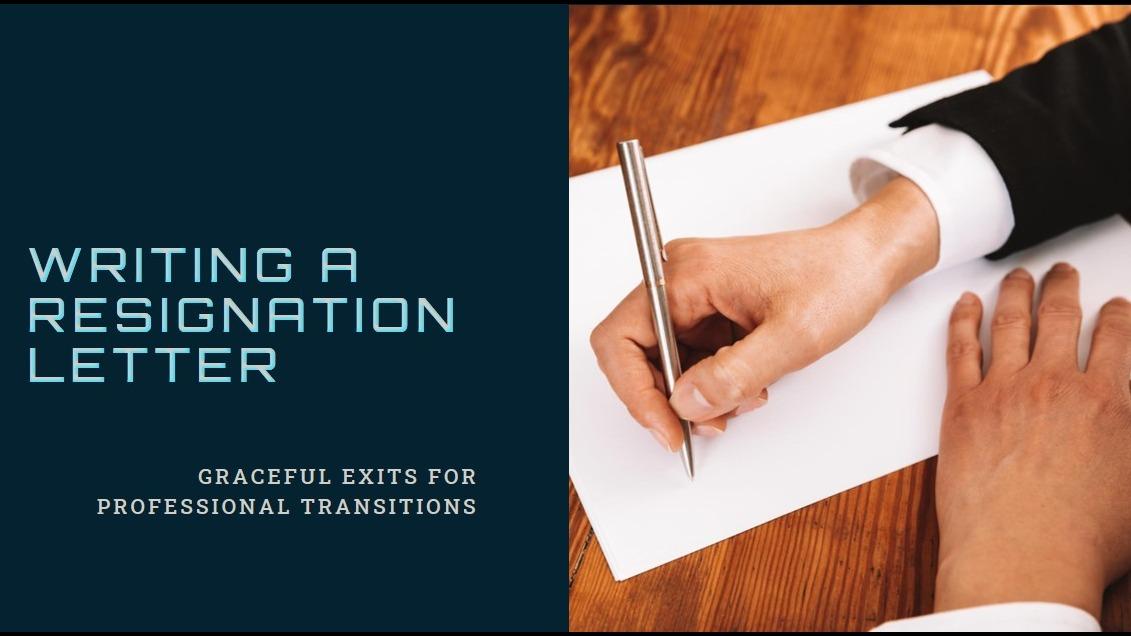
Writing a Resignation Letter: Graceful Exits for Professional Transitions
Jan 11, 2024. By Admin
Introduction
Transitioning from one professional chapter to another is inevitable in one's career. A crucial aspect of this journey is bidding farewell to your current workplace with a well-crafted resignation letter. In this guide, we'll delve into the art of writing a resignation letter that not only communicates your departure professionally but also leaves a positive impression.
Why Resignation Letters Matter
Before we dive into the nitty-gritty of crafting a resignation letter, it's essential to understand why this seemingly mundane document holds such significance. A well-written resignation letter serves as a bridge between you and your soon-to-be former employer, facilitating a smooth and respectful departure. It reflects your professionalism, courtesy, and commitment to maintaining strong professional relationships.
The Dos and Don'ts of Resignation Letters
Dos
-
Be Clear and Direct:
Start your resignation letter by clearly stating your intention to resign. Avoid ambiguity and get straight to the point. -
Express Gratitude:
Take the opportunity to express gratitude for the opportunities and experiences gained during your tenure. Acknowledge the positive aspects of your time with the company. -
Provide Notice Period:
Specify your intended last working day and offer to assist in the transition during your notice period. This shows your commitment to ensuring a seamless handover. -
Offer Assistance:
Reassure your employer of your willingness to assist in the transition process. Whether it's training a replacement or documenting key processes, this gesture goes a long way.
Don'ts
-
Avoid Negativity:
Refrain from expressing negative sentiments about the company, colleagues, or management in your resignation letter. Maintain a positive and professional tone. -
Keep it Concise:
While expressing gratitude is crucial, avoid turning your resignation letter into a lengthy memoir. Keep it concise and to the point. -
Do Not Burn Bridges:
Even if you have had challenging experiences, resist the urge to burn bridges. You never know when your paths might cross again. -
Do Not Delay:
Submit your resignation letter in a timely manner. Delaying the process can create unnecessary stress and may tarnish your professional reputation.
Crafting the Perfect Resignation Letter
1. Addressing the Letter
Begin your resignation letter with a professional salutation, addressing your immediate supervisor or relevant authority. Keep it formal and respectful.
2. Opening Paragraph
In the opening paragraph, clearly state your intention to resign and provide your official last day of work. Express your gratitude for the opportunities and experiences gained during your time with the company.
3. Body of the Letter
Use the body of the letter to elaborate on your decision. You can briefly mention the reasons for your departure, but focus on the positive aspects of your time with the company. Highlight the skills and knowledge you've acquired and express your commitment to ensuring a smooth transition.
4. Closing Paragraph
In the closing paragraph, reiterate your appreciation for the opportunities provided. Express your willingness to assist with the transition process and provide your contact information for any follow-up communication.
The Personal Touch
Adding a personal touch to your resignation letter can make it more memorable and impactful. Consider sharing a brief anecdote or expressing how your time at the company has contributed to your professional growth.
Opting for Professional Assistance
While crafting your resignation letter is a personal endeavor, seeking professional assistance for your next career move can elevate your chances of success. At CV Designer USA, we specialize in creating compelling resumes that showcase your skills and experiences effectively. Your journey doesn't end with a resignation letter; it's an opportunity for a new beginning. Explore our resume writing services here to ensure you make a lasting impression in your next professional venture.
Conclusion
Mastering the art of resignation letters is an essential skill for any professional. It not only signifies a respectful departure but also lays the foundation for future opportunities. Remember, a well-crafted resignation letter is not just a formality; it's a testament to your professionalism and commitment to leaving on good terms.





ADD COMMENTS
Your email address will not be published. Required fields are marked *